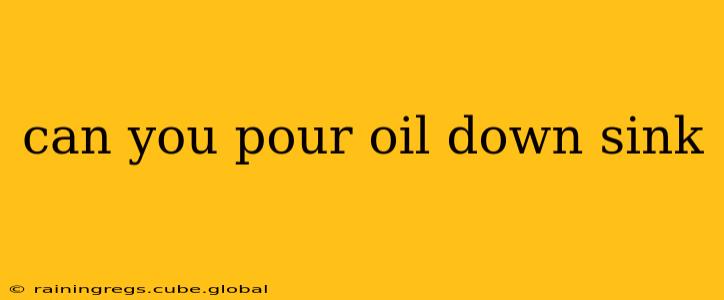Pouring oil down the sink might seem like a convenient solution, but it's a practice that can lead to significant plumbing problems. This guide will explore why this is so harmful, and offer safer, more environmentally friendly alternatives.
What Happens When You Pour Oil Down the Sink?
When you pour cooking oil, grease, or fat down the drain, it doesn't simply wash away. Instead, it cools and solidifies, clinging to the inside of your pipes. This buildup gradually restricts water flow, leading to slow drains and eventually clogs. The solidified oil can even attract other debris, exacerbating the problem and potentially causing a complete blockage. This blockage often requires costly professional plumbing services to resolve. Furthermore, the oil can contaminate wastewater treatment systems, harming the environment.
Why is Pouring Oil Down the Sink Bad for the Environment?
Beyond the immediate plumbing issues, pouring oil down the sink has serious environmental consequences. Wastewater treatment plants aren't designed to handle large quantities of oil. When oil enters the system, it can disrupt the biological processes that break down waste, leading to reduced efficiency and potential pollution of waterways. The oil can harm aquatic life, disrupting ecosystems and affecting water quality.
What are the Alternatives to Pouring Oil Down the Sink?
Fortunately, there are several easy and eco-friendly ways to dispose of cooking oil:
- Cool and pour into a container: Allow the oil to cool completely before pouring it into a sealed container (like a used jar or bottle). Once the container is full, you can dispose of it responsibly.
- Reuse the oil: Many cooking oils can be reused multiple times. Strain the oil through a fine-mesh sieve or cheesecloth to remove any food particles before reusing.
- Recycle cooking oil: Many municipalities offer cooking oil recycling programs. Check with your local waste management department to see if this option is available in your area. Some grocery stores and restaurants also have collection points.
- Absorb with paper towels or kitty litter: For small spills, you can absorb the oil with paper towels or kitty litter. Dispose of the used materials in the trash.
How Can I Prevent Future Clogs Caused by Oil?
Preventing clogs is far easier than dealing with them. Here are some proactive measures:
- Regularly clean your drain: Use a drain cleaner designed for grease and oil buildup (following the product instructions carefully). Alternatively, boiling water can help loosen some grease build-up.
- Use a drain strainer: A sink strainer will catch food scraps and other debris before they can reach your pipes and mix with oil.
- Pour boiling water down the drain regularly: This helps melt away any accumulated grease before it solidifies.
Can I Pour Oil Down the Garbage Disposal?
No, you should absolutely not pour oil down the garbage disposal. This will lead to the same problems as pouring oil directly down the drain – solidified oil buildup, clogs, and environmental damage. The garbage disposal's blades can't effectively break down the oil, and it will still accumulate in your pipes.
What Happens If I Already Poured Oil Down the Sink?
If you’ve already poured oil down the sink, monitor your drains carefully for signs of slow drainage or blockage. If you notice any problems, you might need to use a drain cleaner or call a plumber. The longer you wait, the more difficult and expensive the problem will be to resolve.
By following these tips, you can protect your plumbing system, the environment, and your wallet from the damaging effects of pouring oil down the sink. Remember, a little prevention goes a long way!
